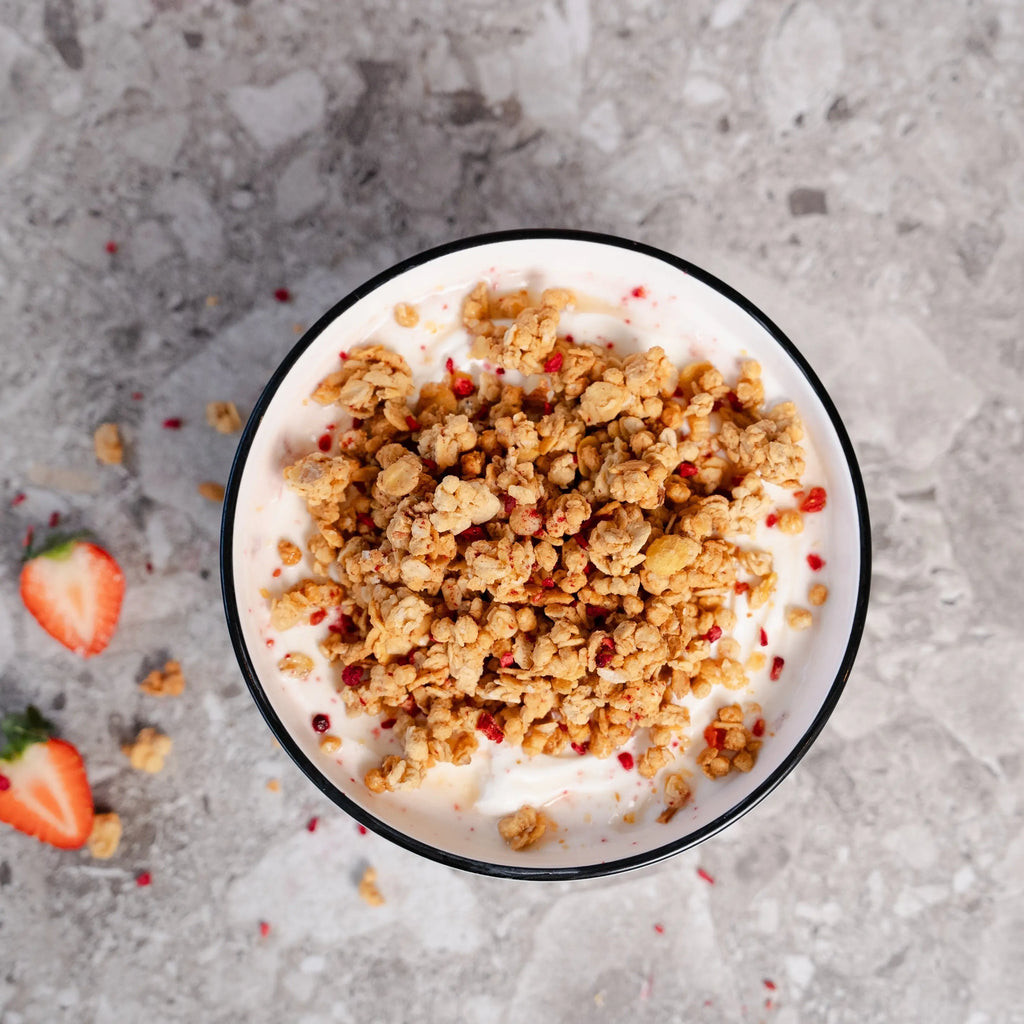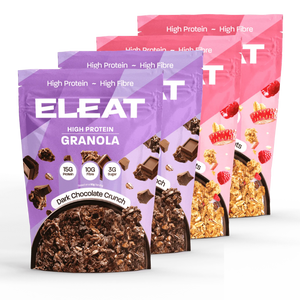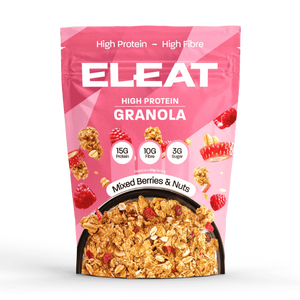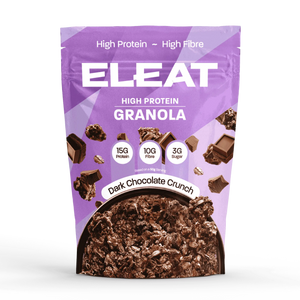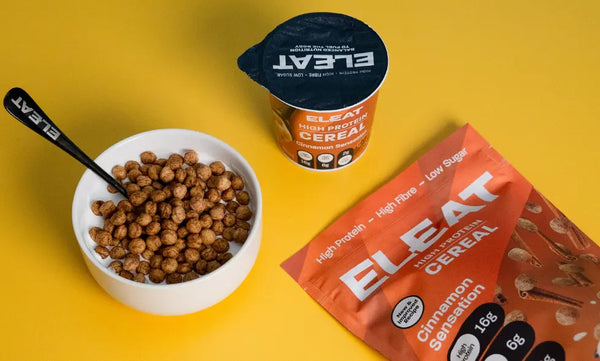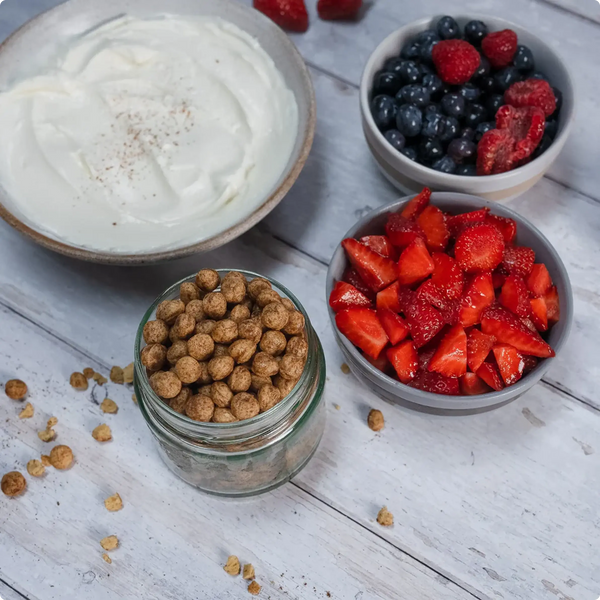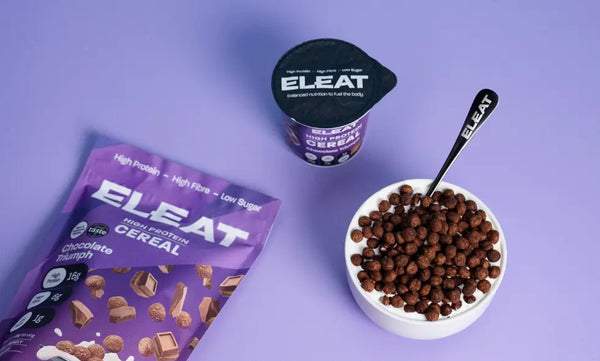In this article:
Granola has long been celebrated as a go-to healthy breakfast or snack option. Its crunchy texture, natural sweetness, and versatility make it a favourite choice for many. But while granola is often touted for its health benefits, how does it really measure up when it comes to protein content? Is it as rich in protein as some of its competitors, or is it more of a carb-heavy treat?
Typically made from oats, nuts, seeds, and sweeteners like honey or maple syrup, granola is packed with a mix of fibre, healthy fats, and carbohydrates. People eat it because it’s convenient, satisfying, and offers a good source of energy throughout the day. It’s also easy to customise, whether you enjoy it on its own, sprinkled over yoghurt, or added to smoothies. But when it comes to protein, is granola truly a protein powerhouse?
In this article, we’ll explore whether granola is high in protein, how you can boost its protein content, and whether it’s a good option for those looking to increase their daily protein intake.
What is Granola Made Of?
Granola is a mixture of simple, whole ingredients that come together to create a crunchy, satisfying snack or breakfast. At its core, granola typically consists of oats, nuts, seeds, dried fruits, and a sweetener. Each ingredient contributes a unique set of nutrients, making granola a versatile option for those looking for a quick, energy-boosting meal.
Oats: The base of most granola recipes, oats are rich in fibre and provide slow-burning carbohydrates to keep you feeling full longer. They also offer a good source of essential vitamins and minerals like manganese and iron.
Nuts and Seeds: These ingredients, such as almonds, walnuts, sunflower seeds, or chia seeds, are packed with healthy fats, protein, and various micronutrients. Nuts and seeds contribute to granola’s crunch and give it a satisfying texture while adding nutritional value.
Dried Fruits: Common fruits like raisins, cranberries, and apricots provide natural sweetness along with vitamins and antioxidants. However, dried fruits can also increase the sugar content of granola, so it’s important to be mindful of how much is added.
Sweeteners: To bring it all together, sweeteners like honey, maple syrup, or agave are often used to bind the ingredients and enhance the flavour. While they offer a natural source of sweetness, they also contribute to the overall sugar content of the granola.
How These Ingredients Affect Nutritional Content
The combination of oats, nuts, seeds, and sweeteners means that granola is generally a balanced source of carbohydrates, fats, and some protein. However, the overall nutritional value can vary depending on the proportions and specific ingredients used.
For instance, using more nuts and seeds boosts the protein and healthy fat content, while opting for fewer sweeteners can help reduce the sugar content. Therefore, when considering granola as part of your diet, it’s important to keep in mind the specific ingredients that contribute to its overall nutritional profile.
Is Granola High In Protein?
Granola is often seen as a healthy option for breakfast or a snack, but when it comes to protein content, not all granolas are created equal. On average, most conventional granolas you find at the supermarket contain about 4 to 6 grams of protein per 50g serving. This amount can vary based on the brand, ingredients, and recipe, but in general, granola isn't considered a high-protein food on its own.
For comparison, here’s how granola stacks up against other protein-rich foods:
Eggs: One large egg contains about 6 grams of protein.
Greek Yoghurt: A typical serving of plain Greek yoghurt can provide around 10–12 grams of protein.
Protein Bars: Many protein bars contain around 10–20 grams of protein per serving, depending on the brand.
As you can see, while granola can provide a decent amount of protein, it's not exactly in the same league as foods that are specifically high in protein like eggs or Greek yoghurt. It’s a good source of fibre, healthy fats, and carbohydrates, but if you’re looking to boost your protein intake, granola alone may not be enough.
Not All Granola’s Are Created Equal…
Now, let’s take a look at how conventional granolas from the supermarket compare to products designed to be higher in protein, like ELEAT High Protein Granola.
Most conventional store-bought granolas tend to be lower in protein and higher in sugar. For example, a typical serving of traditional granola may contain about 4–6 grams of protein per half-cup, but it could also include 10–15 grams of sugar, especially if it's made with sweeteners like honey, maple syrup, or added fruits. While tasty, this combination of ingredients doesn't always align with those looking to increase their protein intake while keeping sugar levels in check.
On the other hand, ELEAT High Protein Granola is specifically formulated to deliver more protein in every bite. Each serving of ELEAT’s granola contains 15 grams of protein per half-cup serving, double the amount found in typical granola.
This boost comes from the inclusion of higher-protein ingredients like soy protein, pumpkin seeds, flaxseeds, chia seeds and nuts. ELEAT’s formula is designed to cater to those who want the benefits of granola (like fibre, healthy fats, and crunch) but need to ensure their meal or snack has a higher protein content to support muscle recovery, satiety, or an active lifestyle.
How To Pick The High Protein Granola For You
If you’re looking for pre-made granola that packs a serious protein punch, there are several high-protein granola brands on the market that cater to protein-conscious consumers. Here are a few examples:
1. ELEAT High Protein Granola
Protein Content: 15 grams of protein per serving
Features: Made with whey protein isolate and a blend of high-protein seeds and nuts, ELEAT offers a protein-rich, low-sugar granola. It's ideal for those who want a quick, convenient, and tasty way to increase protein intake without the extra sugars or carbs
2. Bear Naked Protein Granola
Protein Content: 10 grams of protein per serving
Features: Bear Naked’s Protein Granola uses a combination of oats, almond butter, and pea protein to deliver a solid amount of protein. It's a great option for those who enjoy a crunchy, nutty texture with a little extra protein boost.
3. KIND Protein Granola
Protein Content: 10 grams of protein per serving
Features: KIND's Protein Granola features a mix of almonds, peanuts, and whey protein isolate, offering a good amount of protein in each serving. It also provides healthy fats and fibre, making it a well-rounded option for those who need a quick, on-the-go snack.
By choosing one of these high-protein granolas or adding protein-rich ingredients to your homemade granola, you can easily turn this beloved breakfast food into a solid source of protein. Whether you’re looking for something quick or prefer to customise your own mix, there are plenty of options to ensure you're meeting your protein goals.
Conclusion
Granola can indeed be a part of a protein-rich diet, but it's important to understand that, on its own, it's not necessarily a high-protein food. While typical granola may offer moderate protein levels (around 4–6 grams per serving), you can easily boost its protein content by adding protein-rich ingredients like nuts, seeds, and even protein powder.
Pairing your granola with high-protein foods such as Greek yoghurt or milk can also help make it a more protein-dense option.
For those looking for a ready-to-eat, high-protein granola, products like ELEAT High Protein Granola provide a substantial 15 grams of protein per serving, making it an excellent choice for anyone seeking both convenience and nutrition.
By making smart ingredient choices, whether in homemade granola or opting for a high-protein brand, you can enjoy the satisfying crunch of granola while boosting your protein intake to support muscle growth, satiety, and overall health.




